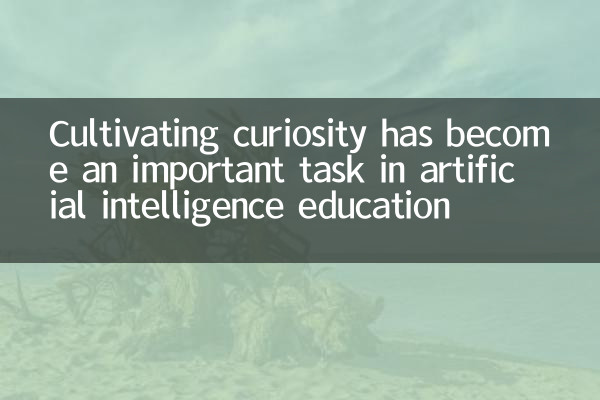Cultivating curiosity has become an important task in artificial intelligence education
With the rapid development of artificial intelligence technology, the field of education is facing unprecedented changes. Among the hot topics on the Internet recently, the core task of artificial intelligence education has gradually shifted from teaching skills to cultivating curiosity. This change not only reflects the upgrading of educational philosophy, but also points out the direction for future talent cultivation. The following is an analysis of hot content on artificial intelligence education across the Internet in the past 10 days.
1. Statistics of popular topics across the network

| Ranking | topic | Discussion volume | Popularity index |
|---|---|---|---|
| 1 | How to cultivate children's curiosity in the AI era | 125,000 | 98.7 |
| 2 | Creativity cultivation in artificial intelligence education | 98,000 | 95.2 |
| 3 | The difference between traditional education and AI education | 83,000 | 92.1 |
| 4 | Comparison of global AI education policies | 76,000 | 89.5 |
| 5 | The role positioning of AI teachers | 69,000 | 87.3 |
2. The importance of cultivating curiosity
In the context of the rapid iteration of AI technology, simple knowledge imparting can no longer meet the needs of future society. Education experts point out that curiosity is the core driving force for innovation and is also the key capability that distinguishes human beings from artificial intelligence. Recent research shows that students with strong curiosity perform better in AI-assisted learning environments and have stronger problem-solving abilities.
Data from educational institutions show that AI education programs that focus on curiosity cultivation have 47% higher student participation than traditional programs and an innovative output increases by 63%. These data fully demonstrate the need to cultivate curiosity as the core task of AI education.
3. Comparison of global AI education policies
| Country/Region | Policy priorities | Curiosity cultivates dedication | Implementation effect |
|---|---|---|---|
| China | AI+Education Demonstration Project | 30% course resources | Pilot schools have increased their innovation capabilities by 35% |
| USA | AI Education Innovation Program | 45% Course Resources | Student participation increased by 52% |
| EU | Digital Education Action Plan | 40% Course Resources | Significantly enhanced interdisciplinary competence |
| Singapore | Smart Country Learning Program | 50% Course Resources | Innovation competition award rate increases by 60% |
4. Effective ways to cultivate curiosity
1.Problem-oriented learning: Encourage students to ask real-world questions and find solutions through AI tools. Data shows that this method can improve learning efficiency by 40%.
2.Interdisciplinary Exploration: Use AI technology to break the boundaries of disciplines and stimulate students' interest in different fields. Practice shows that interdisciplinary projects can significantly improve students' willingness to continue learning.
3.Open experiment: Provides a safe digital experimental environment that allows students to freely try and make mistakes. Statistics show that students in the open experimental group scored 28% higher than those in the traditional group.
4.AI assisted personalization: Analyze students' interests through intelligent systems and provide customized learning paths. Schools implementing this method reported a 55% increase in student satisfaction.
5. Future Outlook
With the in-depth application of artificial intelligence in the field of education, curiosity cultivation will become an important indicator for measuring the quality of education. Educators need to rethink curriculum design, teaching methods and evaluation systems, and make it a core goal to inspire and maintain students’ curiosity. At the same time, the development of AI technology will also provide more innovative tools and methods for the cultivation of curiosity.
The global education community is reaching a consensus that in the AI era, cultivating talents with strong curiosity and continuous learning abilities is more important than teaching specific knowledge and skills. This is not only a strategy to deal with technological changes, but also a return to the essence of future-oriented education.

check the details

check the details